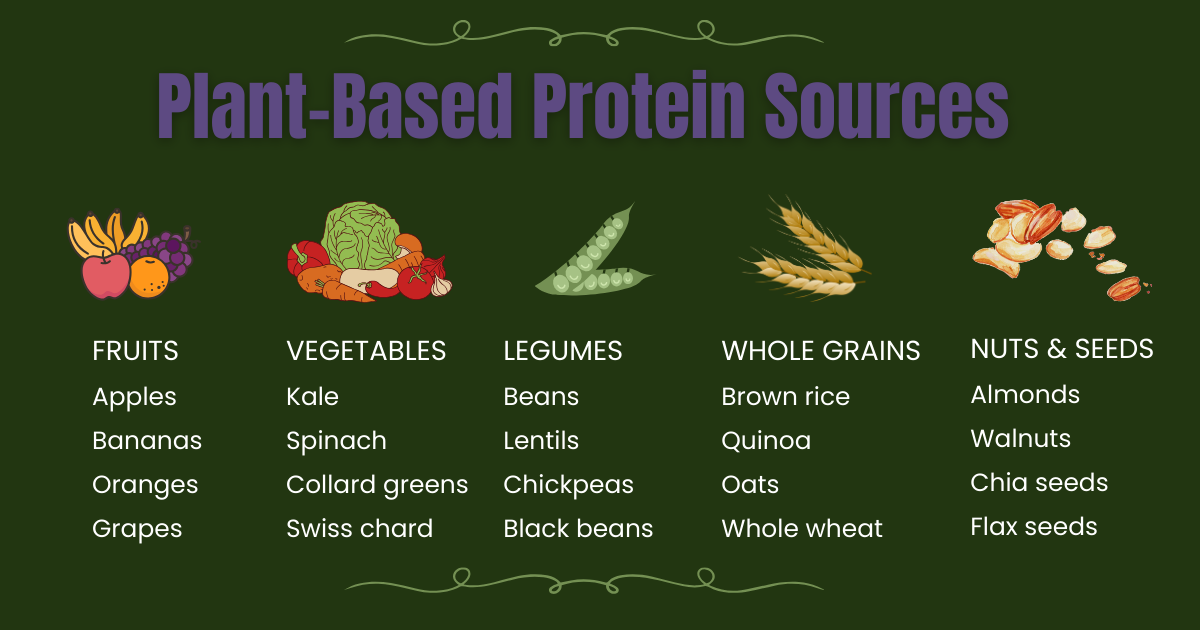Imagine a world where we have the power to prevent, manage, and even reverse some of the most common chronic diseases simply by making changes to what we eat. It may sound too good to be true, but it's not just a dream - it's a reality!
Our food choices have the potential to be a powerful tool in the fight against common chronic diseases like heart disease, diabetes, cancer, and other health-related diseases.
By understanding the significant role that food plays in our lives, we can harness the power of plant-based foods and unlock their potential to pave the way for a healthier and more vibrant future.

What is a Plant-Based Diet?
A plant-based diet is a dietary approach that puts a strong emphasis on consuming whole, minimally processed foodsderived from plants.[1] This includes an abundance of vegetables, fruits, whole grains, legumes, nuts, and seeds.
The diet completely eliminates or significantly reduces animal products such as meat, poultry, fish, dairy, and eggs, as well as products that contain these ingredients.
There are many plant-based foods that you can add to your diet. Here are a few examples:

Remember, a plant-based diet can be both healthy and delicious!
Why a Plant-Based Diet?
Adopting a plant-based diet can offer a variety of nutritional benefits to our bodies. Plant-based foods are abundant in vitamins, minerals, and fibers, and they usually have lower levels of saturated fats and calories than animal-based foods.
Studies have demonstrated that plant-based diets can reduce the risk of heart disease, diabetes, and cancer. Moreover, plant-based diets can aid in weight loss, improve digestion, and enhance overall energy levels.
It is crucial to make sure you are consuming enough protein, iron, and vitamins when following a plant-based diet, but with careful planning, it can be a healthy and delicious way to nourish your body.

Can a Plant-Based Diet Reverse Chronic Diseases?
Heart Disease
Plant-based diets have been proven to effectively reduce the risk of heart disease. This is due to the fact that plant-based foods contain low levels of saturated fat and cholesterol, which are known risk factors for heart disease.
A large study in over 2276 cardiovascular health conditions found that those who obtained their protein from nuts and seeds had a significantly lower riskof developing heart diseases than those who obtained their protein from meat.[2]
Plant-based foods are excellent sources of fiber and can be easily incorporated into a plant-based diet, promoting heart health.
Diabetes
According to research, adopting a plant-based diet can significantly lower the risk of developing Type 2 diabetes and improve blood sugar controlin people already diagnosed with diabetes.[3]
A plant-based diet is rich in fiber, which can help regulate blood sugar levels. This is particularly important for individuals with diabetes or those at risk of developing diabetes.
Adding vegetables, fruits, whole grains, and legumes to your diet can prevent and manage diabetes while promoting overall health.
Cancer
Research has suggested that a diet rich in plant-based foods can help prevent cancer. These plant-based foods contain dietary sources of several bioactive compounds such as fiber, vitamins, antioxidants, and anti-inflammatory compounds. [4]
By consuming plant-based foods, one can benefit from the high levels of anti-inflammatory compounds, ultimately reducing inflammation, and improving a healthy immune system.
A diet that is primarily composed of plant-based foods, particularly vegetables and fruits, can help to decrease the risk of developing cancer.
Comparison of a Plant-Based Diet with Other Dietary Approaches
Plant-based diets have been scientifically proven to offer numerous health benefits, such as lowering the risk of chronic diseases like heart disease, diabetes, and cancer.
However, it is crucial to note that not all plant-based diets are created equal. Some may contain high amounts of processed foods and low levels of essential nutrients, making it necessary to ensure that you consume a balanced diet that satisfies your individual nutritional needs.
In the end, the most effective diet depends on your personal preferences and health objectives.
Tips for Transitioning to a Plant-Based Diet
If you're looking to transition to a plant-based diet, there are a few things you can do to make the process smoother. Here are some tips to help you get started:
1. Take it slow
Don't try to switch to a completely plant-based diet all at once. Start by incorporating 5 plant-based sources into your meals and gradually reduce your intake of animal products. Taking it slow will help your body adjust and make the transition easier.
2. Explore new recipes
There are plenty of delicious plant-based recipes available. Try out different options and find what you enjoy.
3. Find plant-based alternatives
Tofu, tempeh, and plant-based milk are just a few options. Try out different substitutes to find what you like best.
4. Protein is key
It's important to ensure that your body is getting enough protein when transitioning to a plant-based diet. Look for plant-based sources of protein such as beans, lentils, nuts, and seeds.
Choosing a healthy plant-based and vegan diet is most beneficial when it comes to:

-
Higher levels of energy;
-
Improved sleep;
-
Aids in energy and overall happiness;
-
Provides a sense of comfort and relief;
-
Could prevent major diseases such as obesity and diabetes;
-
Accomplish weight-loss and management; and
-
Improves mental and cognitive functioning.
There are really no excuses not to try healthier habits in your everyday life. If you are a man or woman looking for specific benefits of adopting healthier habits or just want to know about the general healing properties of herbs. Please remember to comment or post any health questions, or contact us directly!
Also, feel free to share any of your favorite recipes to make and share it with the Assuaged community on our ➡️ Share A Recipe ⬅️ page!














